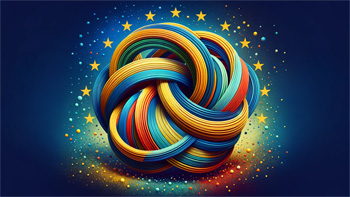The European Union (EU) stands as a remarkable political and economic union, encompassing a significant portion of the European continent. Founded with the aim of fostering economic cooperation and preventing conflict, the EU has evolved into a powerful entity influencing global politics, economics, and social issues. Its journey from a simple economic union to a comprehensive entity with its own currency, parliament, and laws is a testament to the vision of a united and prosperous Europe.
Historical Background and Formation
The seeds of the European Union were planted in the aftermath of World War II, with the aim of fostering economic cooperation and preventing further conflicts in Europe. The EU's origins can be traced back to the European Coal and Steel Community (ECSC) and the European Economic Community (EEC), established by the Treaties of Rome in 1957. These initial steps focused on economic integration, setting the groundwork for the formation of the EU.
Expansion and Integration
Over the years, the European Union has seen significant expansion and integration. From its initial six member states, the EU has grown to include 27 countries. This expansion reflects the EU's appeal as a zone of stability, democracy, and economic opportunity. The Maastricht Treaty of 1992 marked a significant milestone, introducing the concept of the European Union and paving the way for further integration in areas such as foreign policy, justice, and security.
Institutional Structure
The EU's institutional structure is unique and complex, featuring several key bodies that play distinct roles. The European Commission acts as the EU's executive arm, proposing legislation and ensuring its implementation. The European Parliament, elected by EU citizens, represents the people's interests and shares legislative powers with the Council of the European Union. The European Council, comprising the heads of member states, sets the EU's overall policy agenda and priorities.
Economic Policies and the Eurozone
Economic integration is a cornerstone of the EU, exemplified by the creation of the Eurozone, a monetary union that adopted the euro as a common currency. This economic integration facilitates free trade and movement of goods, services, and capital, contributing to the EU's status as one of the world's largest economies. The EU also implements policies aimed at regional development, social inclusion, and environmental sustainability.
Foreign Relations and Global Influence
The European Union plays a significant role in international affairs, wielding influence through diplomacy, trade agreements, and aid programs. The EU's foreign policy is driven by principles of democracy, human rights, and the rule of law. It actively participates in global discussions on climate change, sustainable development, and conflict resolution, demonstrating its commitment to addressing global challenges.
Challenges and Future Prospects
Despite its successes, the EU faces numerous challenges, including economic disparities among member states, migration issues, and rising nationalist sentiments. The Brexit referendum, in which the United Kingdom voted to leave the EU, highlighted these challenges and their potential impact on the union's future. The EU continues to work towards addressing these issues, aiming to maintain unity and strengthen its role on the global stage.
Cultural and Social Impact
The European Union's influence extends beyond politics and economics, impacting cultural and social aspects of life in Europe. The EU promotes cultural exchange and understanding through various programs and initiatives, fostering a sense of European identity while respecting national and regional diversity. Its policies on education, health, and consumer rights significantly affect the daily lives of its citizens.

